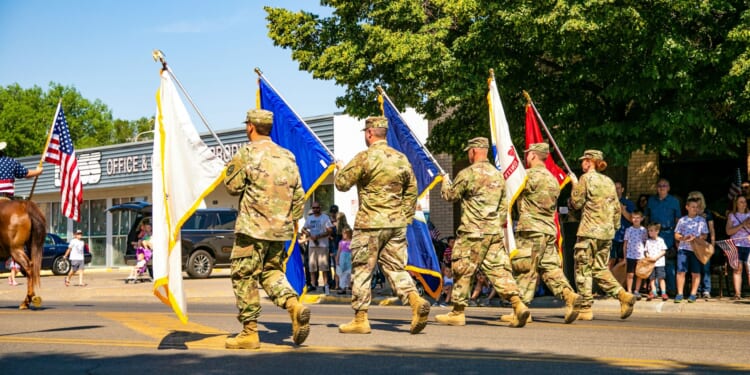After Secretary of War Pete Hegseth’s speech to senior commanders on military fitness and standards, my social media accounts lit up. One representative comment went like this: “Hegseth said we’re going back to gender roll (sic) jobs! So it looks like all you ladies are gonna be in the mail room and admin!” Yeah—she couldn’t even spell “role” correctly.
That online sneer is only one small example of the bitterness I see every time conservative veterans or active-duty servicemembers speak up about returning the military to its core purpose. But a few days ago, Hegseth reminded me why I raised my hand to serve in the first place.
He said bluntly, “To ensure peace, we must prepare for war.” From that moment he redeclared the Pentagon’s central mission: warfighting—preparing for war and preparing to win, and being unrelenting and uncompromising in that pursuit.
As a Marine Corps veteran, I listened with pride. For too long, the service of our men and women in uniform has been distracted by initiatives that drew attention away from the battlefield tradecraft that truly keeps Americans safe.
Secretary Hegseth’s speech was a public recommitment to the reality that strength deters aggression, that competence wins wars, and that peace is secured most reliably by being able and willing to fight.
But my social feeds tell a different story. In veteran groups I belong to, conversations about Pentagon decisions and the administration’s changes often dissolve into contempt.
In one instance, a poster simply asked if there were any conservative female veterans in her area, looking to meet up with community. The response? Disgraceful.
“I’d rather stand alone in the world than stand with cowards and fascist hypocrites. If a Marine is a Trump supporter, they are not my sister.”
“So would you abandon that person on the battlefield?”
“I wouldn’t be on the battlefield with them in the first place. At least not on the same side.”
Yes. A United States Marine said that on a public platform. Of course, she said as Anonymous member.
That kind of tribalism is corrosive. We are supposed to be bonded by service, not divided by party. The military, and the veteran community, cannot function as a collection of political tribes if we expect cohesion on the battlefield.
When I was active duty, maybe two times did I ever have a conversation with my fellow Marines about our political values. It was never a factor; we all signed up to be Marines because we loved our country, and that was evident. On rare occasions, someone made a comment, but in my experience, it was never met with hostility.
We can disagree on politics and still agree on readiness, discipline, and the obligation to preserve peace through strength.
That is why Secretary Hegseth’s emphasis on culture and standards matters. He argued that foolish and reckless political leadership had looked to the wrong compass and led their forces astray, that a return to warrior standards is essential to restore operational focus. Whether you agree with every policy he proposes, the central thrust—making lethality and readiness the organizing principle—is sound. Our adversaries do not negotiate from weakness, they test strength.
Preparing to win, with discipline and competence, is not warmongering. It is stewardship of the peace we cherish.
I do not romanticize war, nor do I want conflict. None of us who have served wants war. But we must be honest: Peace is not a passive state; it is often the product of credible, decisive power. If our military becomes primarily an instrument for messaging, checklists, or social experiments that detract from combat readiness, we abdicate our duty to the nation and the families who send their loved ones to serve. The mission must come first.
Championing readiness and lethality means ensuring every service member, regardless of gender, is trained, equipped, and expected to meet the standards necessary to prevail.
Secretary Hegseth’s speech was an inspiring call to return to basics: mission, discipline, and the readiness to win. We owe our gratitude to those who wear the uniform, and we owe the nation a military that is unquestionably prepared. If we reclaim that focus, not as a partisan project but as a duty to the American people, we will preserve the peace we love by maintaining the strength necessary to protect it.











